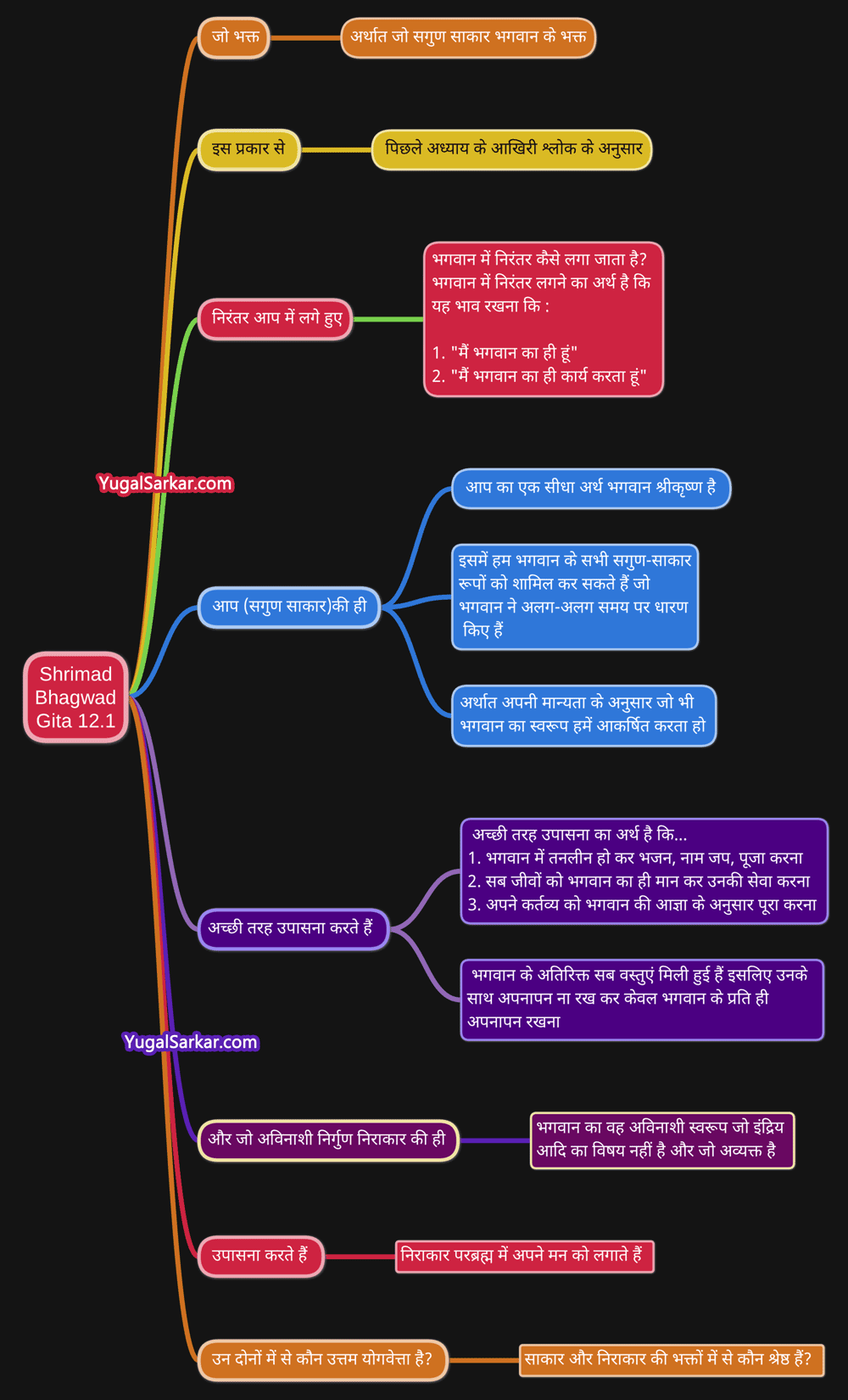Bhagavad Gita Chapter 12 Verse 1
भगवद् गीता अध्याय 12 श्लोक 1
अर्जुन उवाच
एवं सततयुक्ता ये भक्तास्त्वां पर्युपासते।
येचाप्यक्षरमव्यक्तं तेषां के योगवित्तमाः।।12.1।।
हिंदी अनुवाद - स्वामी रामसुख दास जी ( भगवद् गीता 12.1)
।।12.1।।जो भक्त इस प्रकार निरन्तर आपमें लगे रहकर आप(सगुण भगवान्) की उपासना करते हैं और जो अविनाशी निराकारकी ही उपासना करते हैं? उनमेंसे उत्तम योगवेत्ता कौन हैं

English Translation of Sanskrit Commentary By Sri Shankaracharya's
12.1 The subject-matter stated in the immediately preceding verse, ৷৷.he who works for Me, etc. is referred to by the word evam (thus). Ye bhaktah, those devotees who, seeking no other refuge; evam, thus; satata-yuktah, being ever-devoted, i.e., remaining unceasingly engaged in the works of the Lord, etc., intent on the aforesaid purpose; paryupasate, meditate; tvam, on You, in the Cosmic form as revealed earlier; ye ca api, and those others, again, who have renounced all desires, who have given up all actions; who meditate on Brahman as described (below), aksaram, on the Immutable; avyaktam, on the Unmanifested, which is so on account of being bereft of all limiting adjuncts, (and) which is beyond the comprehension of the organs-in the world, whatever comes within the range of the organs is said to be manifest, for the root anj conveys that sense; but this Immutable is the opposite of that and is endowed with alifications that are spoken of by the great ones; those again, who meditate on that-; tesam, of them, among the two (groups); ke, who; are the yoga-vit-tamah, best experiencers of yoga, i.e., who are those that are surpassingly versed in yoga? But leave alone those who meditate on the Immutable, who are fully enlightened and are free from desires. Whatever has to be said with regard to them, we shall say later on. As for those others-
English Translation of Commentary - Dr. S. Sankaranarayan
12.1 Evam etc. The estion is for getting an explanation regarding the superiority among those who are the worshippers of the Absolute with Sovereign power, by the said method and those who worship the Self alone [without any attribute].
English Translation of Ramanuja's Sanskrit Commentary
12.1 Arjuna said These are two types of spiritual aspirants who are contrasted thus: (1) On the one hand there are those devotees who adore You thus; namely, in the way taught in such text as Whosoever works for Me (11.55), and who are desirous of being ever integrated with You, namely, considering You as the supreme end. They adore You in utter devotion - You, the ocean of boundless attributes of limitless excellence like grace, affability, omniscience, true resolve etc., and endowed with all glory. (2) On the other hand there are those who meditate on the Imperishable, (Aksara) namely, the individual self in Its true nature, which is the same as the Unmanifest (Avyakta), namely that whose nature cannot be grasped by organs such as the eye etc. The estion posed is: Which of these two classes of devotees have greater knowledge of Yoga? Who would reach their respective goals sooner? Such is the meaning of the estion. Sri Krsna clearly states later on, O Arjuna, I become before long their redeemer from the fatal sea of recurring births and deaths (12.7), with reference to the speed with which the latter kind of devotees reach Him.
Transliteration Bhagavad Gita 12.1
Arjuna Uvaacha: Evam satatayuktaa ye bhaktaastwaam paryupaasate; Ye chaapyaksharamavyaktam teshaam ke yogavittamaah.
Word Meanings Bhagavad Gita 12.1
arjunaḥ uvācha—Arjun said; evam—thus; satata—steadfastly; yuktāḥ—devoted; ye—those; bhaktāḥ—devotees; tvām—you; paryupāsate—worship; ye—those; cha—and; api—also; akṣharam—the imperishable; avyaktam—the formless Brahman; teṣhām—of them; ke—who; yoga-vit-tamāḥ—more perfect in Yog